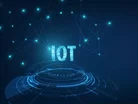Advancing payment processing with IoT

As with many industries, IoT is playing a huge part in the fintech market.
Whether it’s improving customer service, enhancing authentication and security or increasing operational efficiencies, IoT (internet of things) has the potential to drive significant change in the financial industry.
At Wireless Logic, we believe there is plenty of scope for further fintech and IoT integration in the future. Specifically in relation to contactless payments, the rise of cellular connectivity and safer fintech deployments.
Move to a cashless society
As we continue to migrate day-to-day tasks to digital platforms, alternative payment methods to cash are becoming hugely important. Powered by contactless credit and debit cards or mobile devices, we will see society increasingly move away from physical cash, offering a higher level of convenience than traditional payment systems.
IoT is able to make payment processing faster, easier and more convenient for both customers and retailers. The coronavirus pandemic has only accelerated this change towards a cashless society, complemented by the growth of e-commerce and contactless payments.
This progression will continue as the world strives to define and adapt to the ‘new normal’, as it helps limit consumer exposure and promote social distancing measures during the pandemic.
Why cellular and not fixed line connectivity?
Payments are increasingly required in ‘pop-up’ or new locations, and often fixed-line connectivity isn’t always the best answer. Cellular connectivity over a private infrastructure offers lower costs and improved connectivity.
Within the fintech industry, vendors can also be confident in its high levels of data security, which is a vital requirement to their systems. Cellular connectivity solutions are able to leverage private network technology, such as certified VPNs and direct physical interconnects in data centres, to help layer security for devices, networks, and all data encompassed within.
Safe and smart deployments
Secure data processing and management is also increasingly important in the fintech industry. As more and more security devices become connected through IoT, encryption and vulnerability testing are crucial to ensure secure data transmission.
As with any IoT strategies, vendors need to install regular updates and firmware on network devices. Standards such as the ISO27001 are a minimum requirement for businesses in this space as they provide assurance around data processing and operational processes.
It’s also important for fintechs to invest in their people. Armed with the right tools and processes, properly trained staff can significantly reduce the risks to unprotected data and vendor reputations.
This article was contributed by Mark Appleby, IoT Business Development Manager at Wireless Logic

